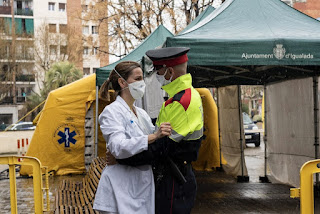Al final tendremos que ser los profesionales sanitarios quienes expliquemos en qué consiste la nueva sanidad. No esperen que políticos o gestores lo hagan. Es demasiado impopular, destruye muchos votos y cabrea sobremanera al personal. Disculpen el tono pero está la cosa caliente.
Los hechos: llevamos meses enfrentándonos como sociedad globalizada a una pandemia. Cada país se intenta defender con políticas y recursos, dentro de estos con su sistema sanitario. En España contamos con un sistema de asistencia sanitaria precarizado y pobremente financiado que está muy debilitado por los recortes de los últimos años. Muchos profesionales sanitarios se sienten maltratados y están al borde de quemarse.
El problema: al lidiar con una enfermedad infecciosa muy contagiosa es necesario tomar medidas para evitar situaciones de peligro y proteger a la población. El uso de mascarillas, mantener la distancia y evitar aglomeraciones en sitios cerrados son ejemplos. Los centros sanitarios son sitios cerrados muy concurridos donde coinciden mucha gente enferma. Es fundamental que no se conviertan en focos de infección, para ello las salas de espera deben estar casi vacías. Esto implica modificar profundamente el tipo de asistencia, potenciando los canales de comunicación no presenciales y limitando la asistencia directa a lo imprescindible.
Los ciudadanos están muy enfadados al ver que de un día para otro les han quitado de las manos el tipo de asistencia sanitaria que tenían: muy accesible (cita en el día o al día siguiente en el centro de salud), universal y gratuita. En lugar de poder ir a la consulta de la enfermera o la médica ven que les llaman por teléfono y se sienten engañados.
Me temo que no hay trampa ni cartón. Por un lado el Sistema Sanitario no puede más, por otro la pandemia de coronavirus no permite que las cosas sean como antes.
Habrá que acostumbrarse a que ya no es posible ir a urgencias a las dos de la madrugada por un grano o acudir sin cita al médico de cabecera porque llevo una hora con dolor de garganta. Las cuestiones de salud menores se deberán solucionar en casa sin acudir a ningún centro, como se ha hecho toda la vida, y para las más graves llamar por teléfono y preguntar qué hacer. Las urgencias vitales se seguirán atendiendo en el momento, pero me temo que solo estas estarán justificadas. Lo demás deberá esperar o deberá ser atendido de otra forma.
Esto no lo se lo contarán por televisión ni verán al señor ministro o al consejero de sanidad de turno explicándolo. Por eso como sanitarios se lo contamos claramente. Lo más inteligente es que no vuelque su enfado sobre los profesionales que están para cuidarle sino sobre los responsables que deben poner los medios y los fondos para que esto sea posible.
Explaining the new health care
Since no one has done so, it will be up to us health professionals to explain what the new health system is all about. Do not expect politicians or managers to do this. It is too unpopular, it destroys many votes and it makes society very angry.
The facts: we have been facing a pandemic for months as a globalised society. Every country is trying to defend itself with policies and resources, within these with its national health system. In Spain we have a precarious and poorly funded health care system that is severely weakened by the cuts of recent years. Many health professionals feel mistreated and are on the verge of burning out.
The problem: when dealing with a highly contagious infectious disease it is necessary to take measures to avoid dangerous situations and protect the population. Wearing masks, keeping your distance and avoiding crowds indoors are examples. Healthcare facilities are busy indoor places where many sick people congregate. It is essential that they do not become sources of infection, for which reason waiting rooms must be almost empty. This implies a profound change in the type of assistance, strengthening non-presential communication channels and limiting direct assistance to what is essential.
Citizens are very angry when they see that from one day to the next they have been deprived of the type of healthcare they had: very accessible (appointment on the day or the next day at the health centre), universal and free. Instead of being able to go to the nurse's or doctor's office, they see that they are called on the phone and feel cheated.
I'm afraid this is not a scam. On the one hand the Health System can't stand it anymore, on the other hand the coronavirus pandemic doesn't allow things to be as they used to be.
We will have to get used to the fact that it is no longer possible to go to the emergency room at two in the morning for a pimple or to go without an appointment to the family doctor because I have had a sore throat for an hour. Minor health issues should be solved at home without going to any centre, as has been done all your life, and for the more serious ones, you should phone and ask what to do. Vital emergencies will continue to be attended to at the moment, but I fear that only these will be justified. The rest will have to wait or be dealt with in another way.
You will not be told this on television or see the minister or the health adviser on duty explaining it. That is why we, as health workers, are telling you clearly. The most intelligent thing is not to turn your anger on the professionals who are there to care for you, but on those responsible who must provide the means and funds to make this possible.
解釋新的醫療保健
自動翻譯,對錯誤感到抱歉。
由於沒有人這樣做,因此由我們的衛生專業人員來解釋新衛生系統的含義。不要期望政客或管理者這樣做。這太不受歡迎了,它破壞了很多選票,使社會非常生氣。
事實:作為全球化的社會,我們已經面臨大流行幾個月。每個國家都試圖通過其國家衛生系統中的政策和資源來捍衛自己。在西班牙,我們的醫療體系a可危,資金匱乏,近年來的削減嚴重削弱了該體系。許多衛生專業人員感到受了虐待,瀕臨精疲力盡。
問題:在應對具有高度傳染性的傳染病時,必須採取措施避免危險情況並保護居民。例如,戴口罩,保持距離並避免在室內擁擠。醫療保健設施是繁忙的室內場所,許多病人聚集在此。至關重要的是,它們不能成為感染源,因此候診室必須幾乎是空的。這意味著援助類型將發生深刻變化,加強非代表交流渠道,並將直接援助限制在必要範圍之內。
公民看到自己從一天到第二天被剝奪了自己所擁有的醫療保健種類時感到非常生氣:非常容易獲得(在健康中心的第二天或第二天被任命),普遍且免費。他們看到不能打電話到護士或醫生的辦公室,而是看到他們在電話裡被騙了。
恐怕這不是騙局。一方面,衛生系統無法忍受它;另一方面,冠狀病毒大流行使事情不再像從前那樣。
我們將不得不適應這樣一個事實,因為我喉嚨痛了一個小時,所以再也無法在凌晨兩點去急診室for了,或者不再去看家庭醫生。輕微的健康問題應該像一生一樣去家裡解決,而不需要去任何中心。對於更嚴重的問題,您應該打電話詢問要做什麼。目前仍將繼續處理重大緊急事件,但我擔心只有這些緊急情況才是合理的。其餘的將不得不等待或以其他方式處理。
您不會在電視上被告知此事,也不會看到值班的部長或衛生顧問對此進行解釋。這就是為什麼我們作為衛生工作者會清楚地告訴您。最明智的做法不是將您的怒火發給在那裡照顧您的專業人員,而是要發洩那些必須提供手段和資金以使之成為可能的負責人。













